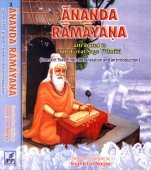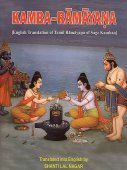Kumaradasa, Kumāradāsa: 7 definitions
Introduction:
Kumaradasa means something in Hinduism, Sanskrit, the history of ancient India. If you want to know the exact meaning, history, etymology or English translation of this term then check out the descriptions on this page. Add your comment or reference to a book if you want to contribute to this summary article.
In Hinduism
Kavya (poetry)
Source: Shodhganga: A critical appreciation of soddhalas udayasundarikathaKumāradāsa (कुमारदास).—He was a king of Ceylon and a son of Kumāramaṇi who died on the battle field. He was brought up by his mother’s brother Śrīmegha and Agrabodhi. Rājaśekhara in his Kāvyamīmāṃsā mentions Kumāradāsa as a poet born blind. The Colophon at the end of the first canto of Jāhakīharaṇa refers to Kumāradāsa as belonging to Ceylon. He is probably the same as king Kumāradhātusena who ruled Ceylon according to Mahāvaṃśa in 515-524 A.D. His Jānakīharaṇa, a poem in twenty cantos, describes the story of Rāma and the abduction of Sītā by Rāvaṇa. Soḍḍhala vaguely mentions him along with Bhāsa and others.

Kavya (काव्य, kavya) refers to Sanskrit poetry, a popular ancient Indian tradition of literature. There have been many Sanskrit poets over the ages, hailing from ancient India and beyond. This topic includes mahakavya, or ‘epic poetry’ and natya, or ‘dramatic poetry’.
Purana and Itihasa (epic history)
Source: archive.org: Puranic EncyclopediaKumāradāsa (कुमारदास).—A Sanskrit poet of the 7th century A.D. His chief work is the great poem called Jānakīharaṇam consisting of twenty cantos.

The Purana (पुराण, purāṇas) refers to Sanskrit literature preserving ancient India’s vast cultural history, including historical legends, religious ceremonies, various arts and sciences. The eighteen mahapuranas total over 400,000 shlokas (metrical couplets) and date to at least several centuries BCE.
India history and geography
Source: academia.edu: The Chronological History of Ancient Sri LankaKumaradasa was the celebrated Sri Lankan author of Janaki Harana Kavya. He was the contemporary of Kalidasa. Pujavali of Mayurapada Thera (3rd century) identifies the King Kumara Dhatusena (718-709 BCE) with Kumaradasa and refers to his tragic end at the funeral pyre of his friend Kalidasa.
A Simhalese work “Parakramabahu Charita” also mentions the story of Kumaradasa and Kalidasa. The Simhalese works like Nikaya Samgraha, Saddharma Ratnakara, Rajaratnakara, and Rajavali also mention that Kumaradasa II was a contemporary of Kalidasa.

The history of India traces the identification of countries, villages, towns and other regions of India, as well as mythology, zoology, royal dynasties, rulers, tribes, local festivities and traditions and regional languages. Ancient India enjoyed religious freedom and encourages the path of Dharma, a concept common to Buddhism, Hinduism, and Jainism.
Languages of India and abroad
Sanskrit dictionary
Source: Cologne Digital Sanskrit Dictionaries: Aufrecht Catalogus CatalogorumKumāradāsa (कुमारदास) as mentioned in Aufrecht’s Catalogus Catalogorum:—poet. Quoted by Kṣemendra in Aucityavicāracarcā 24, Śp. p. 17. [Sūktikarṇāmṛta by Śrīdharadāsa] [Subhāshitāvali by Vallabhadeva] Rāyamukuṭa: Jānakīharaṇa. Academy 1885, 277.
Source: Cologne Digital Sanskrit Dictionaries: Monier-Williams Sanskrit-English DictionaryKumāradāsa (कुमारदास):—[=kumāra-dāsa] [from kumāra] m. Name of a poet
[Sanskrit to German]
Sanskrit, also spelled संस्कृतम् (saṃskṛtam), is an ancient language of India commonly seen as the grandmother of the Indo-European language family (even English!). Closely allied with Prakrit and Pali, Sanskrit is more exhaustive in both grammar and terms and has the most extensive collection of literature in the world, greatly surpassing its sister-languages Greek and Latin.
See also (Relevant definitions)
Partial matches: Kumara, Dasa, Taca.
Full-text: Kumaradhatusena, Kumaradasi, Janakiharana, Nilasa, Nagirikanda, Katacanakapula, Cugariya, Kabuba, Mahagariya.
Relevant text
Search found 5 books and stories containing Kumaradasa, Kumāradāsa, Kumara-dasa, Kumāra-dāsa; (plurals include: Kumaradasas, Kumāradāsas, dasas, dāsas). You can also click to the full overview containing English textual excerpts. Below are direct links for the most relevant articles:
The backdrop of the Srikanthacarita and the Mankhakosa (by Dhrubajit Sarma)
The Raghuvamsa of Kalidasa < [January – March, 1978]
Girisam Looks at Life < [July – Sept. & Oct. – Dec. 1992]
Vastu-shastra (2): Town Planning (by D. N. Shukla)
Kuntaka’s evaluation of Sanskrit literature (by Nikitha. M)
4. Subhāṣitāvalī in Kuntaka’s treatment < [Chapter 5 - Kuntaka’s Evaluation of some Stray Verses]
Kavyamimamsa of Rajasekhara (Study) (by Debabrata Barai)
Related products


